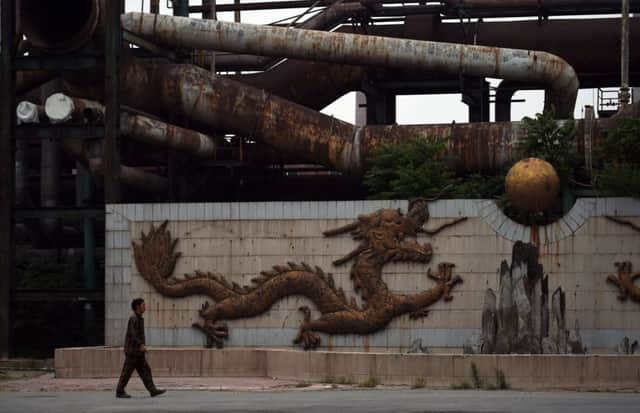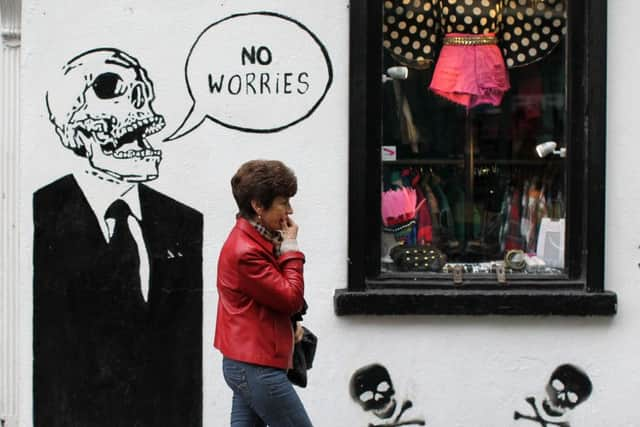Allan Massie: End for China as we know it?


STOCK market volatility is nothing new, and, as Peter Jones wrote here yesterday, the effect of globalisation is to make instability the norm rather than the exception. This week’s panic may nevertheless offer a salutary warning. Financial crashes are becoming more frequent; we seem to get one every seven or eight years.
The trouble this time started in China, and since China has been the engine driving the world economy forward since the western world’s banks went into freefall in 2007, the knock-on effect on other countries, especially those styled “emerging markets”, was bound to be severe. What has alarmed people is the evident failure of the Chinese Communist’s Government’s response - a response that to many smacks of panic. And panic is infectious.
Advertisement
Hide AdAdvertisement
Hide AdChina’s growth has slowed. It was inevitable that it should do so some day. Rapid growth is characteristic of a developing economy, that is, one which is starting from a low base; it is characteristic of the transition from an agrarian economy to an industrial and commercial one. On a much smaller scale this was what happened in the Republic of Ireland in the years of “the Celtic Tiger”. People here in Scotland looked enviously at Ireland’s surging growth. Politicians urged us to emulate it, even though the position of the Irish and Scottish economies was scarcely comparable. Scotland was a mature economy which was trying to adjust to the crumbling of the heavy industry base which had made it a market leader up to the First World War; Ireland, free of such a legacy, was able to grow very fast.


Comparing Ireland with China is like comparing a hillock to a mountain. Nevertheless in both Ireland and China rapid growth was fed into, and then driven forward by, the construction industries. Both countries experienced a housing and infrastructure boom. All such booms come to an end; leaving ghost developments, empty factories, underused roads, railways, airports. In time the wheel doubtless turns, and demand picks up.
China however has been conducting a remarkable experiment: promoting on the one hand a Chinese version of free market capitalism, maintaining on the other an authoritarian political system. The Chinese people have been told to get rich, and many have done so. Yet the Communist Party has retained its monopoly of power. Opposition is not tolerated. Dissidents are persecuted, prosecuted and imprisoned. As in all monopolistic states, corruption has been endemic. The Government has been trying to eradicate it, but pulling up a few nettles does little to clear the ground in which nettles flourish.
Having encouraged a stock market boom, the Chinese Government is trying to put the lid on market volatility. It has commanded pension funds to invest in the market rather than in Government bonds, and it has devalued its currency twice in the space of a few days. This looks like a panicky response. Chinese exports will be cheaper, which is good news for retailers here, but imports of components and finished western goods will be more expensive – bad news for American and European exporters. The fall in the value of the American dollar is an immediate consequence of the China crisis, evidence of the importance of the Chinese economy to the American one. Moreover emerging market countries in Africa, Asia and Latin America are feeling a cold wind coming from China.
It’s quite possible that what is happening in China is no more than a hiccup. Certainly that’s what governments elsewhere must hope. A Chinese slump - recession or depression – would be bad news for the rest of us. The Great Depression which hit the USA and Europe in the 1930s saw global trade contract by a third. Something like that might happen again – in which case the austerity we have endured since the West’s banking crisis in 2007 would be as nothing compared to what we would then experience. That’s how important Chinese prosperity is to the rest of us.
In the long run the fundamental Chinese questions are merely highlighted by the present finance crisis. Can economic liberty co-exist with political autocracy? To what extent can a form of free market capitalism be successfully managed by the Communist Party? One academic on the spot, Professor Christopher Balding, fears that the Government is lurching from one incoherent policy to another, losing credibility and its reputation for competence. “There is a very real risk that Beijing is losing control of the story,” he writes.
The idea that governments exercise effective control over the economy is pretty well discredited here in the West. Instead of directing matters, they respond to events, attempting, sometimes successfully to repair the damage done by the adventurism or “animal spirits” of market operators. Effecting such repairs is a difficult enough job in a time of crisis. Gordon Brown, Alastair Darling and the Bank of England just about brought it off in 2007-8. But the Chinese Government may have a more difficult task still – if, that is, it really has lost control of the story, as well as of events. Since Deng Xaioping abandoned Maoism after “the Great Helmsman’s” death, and put China on the capitalist road to a market economy, the Communist Party has made a deal with the Chinese People: you can prosper and get rich provided you do not challenge the Party’s rule.
For a quarter of a century the deal has been honoured – at least since the massacre in Tiananmen Square in 1989, and the purge of those with “serious tendencies toward bourgeois liberalisation” which followed.
Advertisement
Hide AdAdvertisement
Hide AdProsperity and economic growth made the deal acceptable; it was possible to believe that the Party had set the nation on the right road. So its authoritarianism and corruption were tolerated. But if economic growth stalls, if what is at present principally a stock-exchange crisis becomes something much worse, if it is evident that the Party and the Government don’t have a competent response, then the deal may seem to have been dishonoured. The Party will no longer be delivering what it promised to deliver. What then? A retreat into more severe authoritarianism? Or the crumbling of Party rule?
It might happen suddenly. It would be surprising if the apparatchiks of the Chinese Party were not nervously muttering the name of Gorbachev. They know how quickly the Soviet Union collapsed, once light was admitted to the system.
Meanwhile the rest of the world nervously waits on developments in Beijing and markets will be unsettled for months, even years.